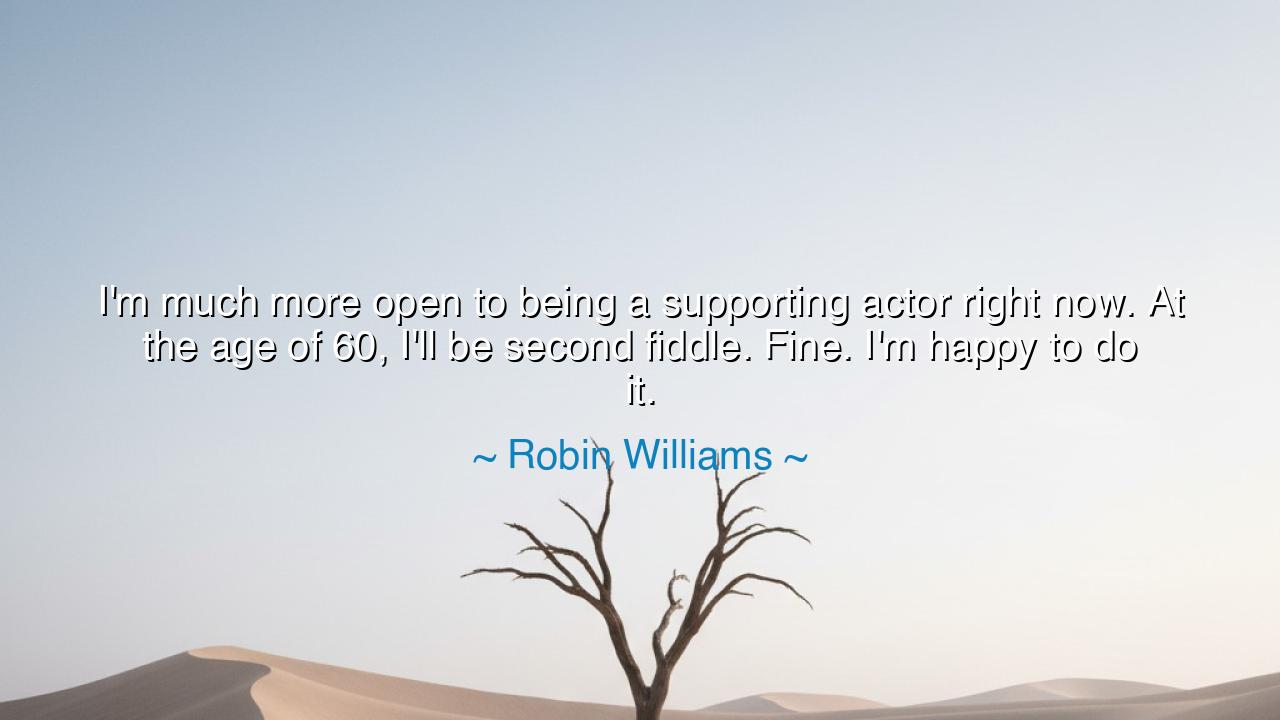
I'm much more open to being a supporting actor right now. At the
I'm much more open to being a supporting actor right now. At the age of 60, I'll be second fiddle. Fine. I'm happy to do it.






The beloved Robin Williams, whose laughter masked a philosopher’s heart, once said: “I’m much more open to being a supporting actor right now. At the age of 60, I’ll be second fiddle. Fine. I’m happy to do it.” In these humble and radiant words, there echoes a truth known to the wise of every age — that greatness is not found in always standing at the center, but in learning to serve the music of life, even from the second chair. Williams, who once commanded the world’s stage with unbounded energy, spoke here not of decline, but of acceptance, of the quiet dignity that comes when the soul matures beyond the hunger for applause.
The origin of this saying lies in a later season of Williams’ career. Having already conquered comedy, film, and the hearts of millions, he began to move toward roles of reflection rather than dominance — mentor instead of hero, teacher instead of star. The young Robin had been a whirlwind, unstoppable and blazing, but the older Robin had learned the grace of stillness. When he said he was happy to be “second fiddle,” he was not surrendering his art — he was embracing the evolution of the artist’s spirit. In his humility, he revealed something profound: that wisdom begins when one ceases to ask for the spotlight and instead seeks harmony with the greater symphony of life.
There is a timeless nobility in such humility. In the grand orchestras of old, the “second fiddle” was not a lesser musician, but one who held the melody together, who supported the brilliance of others. Without them, even the finest solo would fall apart. So too in the theater of life — not all must lead. Some are born to sustain, to uplift, to complete the harmony. Williams, once the comet blazing across the sky, had reached the wisdom of the sunset — the realization that the light need not always blind to be beautiful.
Consider the story of Marcus Aurelius, the Roman emperor and philosopher. He ruled a vast empire, yet his writings reveal a man who learned to let go of pride, who found joy in service rather than supremacy. “Be like the rock,” he wrote, “against which the waves break, but which stands firm.” Like Williams, he discovered that true greatness is not the pursuit of domination, but the peace that comes from knowing one’s place in the order of things. Both men teach the same truth: that maturity brings not ambition, but serenity — not the hunger to be first, but the contentment to be useful.
Williams’ words also speak to the pain and beauty of aging. In a world obsessed with youth, fame, and constant striving, he reminds us that there is grace in acceptance, that time does not diminish value but transforms it. The older artist, like an aged tree, may no longer sprout new branches, yet his roots go deeper, his shade broader. To be “second fiddle” is not defeat — it is wisdom choosing harmony over pride. It is the recognition that joy lies not in being seen, but in contributing meaningfully, however quietly, to the music of others.
How many lives are wasted chasing the illusion of perpetual primacy — the desperate need to always be first, the loudest, the best? Williams, with his disarming laughter, taught another way. He understood that when one steps back from the need to dominate, a deeper freedom arises — the freedom to collaborate, to teach, to share. The true artist, he knew, is one who finds joy in creation itself, not merely in credit. His willingness to “be second fiddle” was, in truth, the mark of a soul liberated from vanity and reborn into gratitude.
The lesson, therefore, is eternal: learn the art of stepping aside with grace. When your season of leading passes, let your next season be one of mentorship, humility, and joy. Celebrate others’ success as you once celebrated your own. Understand that your worth lies not in your position, but in your presence — the wisdom, humor, and kindness you bring to every stage of life. For there will always be a new generation ready to play the first notes, and they will need the steady rhythm of those who came before.
Thus remember, O traveler through the years, that there is no shame in being the supporting player, for even the second fiddle makes the symphony whole. Like Robin Williams, embrace each stage of life with a full heart and open hands. Let your laughter echo not from the center, but from everywhere — woven into the harmony of others’ songs. For the true measure of a life is not how long the spotlight lingers upon you, but how brightly you helped the light to shine on the world.






AAdministratorAdministrator
Welcome, honored guests. Please leave a comment, we will respond soon